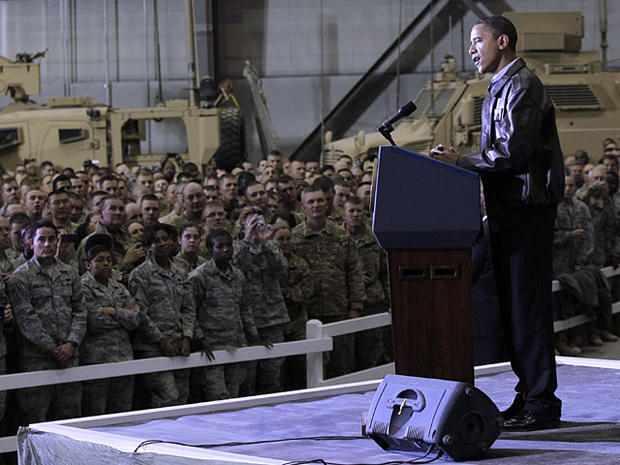How many troops will Obama bring home from Afghanistan in July?
President Obama chaired his monthly Afghanistan/Pakistan war review meeting Monday morning in advance of his decision on how many troops to bring home from Afghanistan next month.
Mr. Obama vowed in 2009 "to begin the transfer of our forces out of Afghanistan in July of 2011." It was a very qualified statement: The fact that the date was only the beginning of the drawdown allowed for the possibility of a relatively small withdrawal, and military leaders stressed that any drawdown was dependent on conditions on the ground.
Still, Mr. Obama said in April that the drawdown of America's roughly 100,000 troops next month "will be significant," even as he has set 2014 as the date for U.S. troops to fully leave the region.
"People will say this is a real process of transition; this is not just a token gesture," he said at the time.
In an interview today with Hearst TV, Mr. Obama said he would be making an announcement "soon."
"What I've said is this summer is a summer of transition where we start handing over more responsibility for the security of Afghanistan to the Afghan government... I intend to follow through on that commitment that I made to the American people," he said.
"By us killing Osama bin Laden, getting al Qaeda back on its heels, stabilizing much of the country in Afghanistan so that the taliban can't take it over... it's now time for to recognize that we've accomplished a big chunk of our mission and that it's time for Afghans to take more responsibility," he added.
The president's decision on what to do next month comes amid competing pressures. Appearing in Afghanistan Monday, outgoing Defense Secretary Robert Gates warned against a fast drawdown. "My view is that we've got to keep the pressure on. We're not quite there yet," he said.
Added Gates: "We've still got a ways to go and I just think we shouldn't let up on the gas too much at least for the next few months."
Yet pressure to speed U.S. withdrawal from the country has grown significantly in the wake of the killing of Osama bin Laden. Public support for the nearly decade-long war remains low, and some members of Congress - spurred in part by financial concerns - are pushing for the president to consider an accelerated timetable.
Unnamed senior administration officials told the New York Times in a Monday story that they are considering steeper reductions than they did just weeks ago, when the plan was to bring 3,000-5,000 troops home. The president is reportedly considering a "sharp" troop drawdown.
Complicating matters has been Pakistan's anger over the U.S. mission to kill bin Laden in Pakistani territory, which resulted in the country temporary shuttering of an important border crossing into Afghanistan, cutting off a U.S. supply route. The degree to which the U.S.-Pakistan relationship endures - or disintegrates - in the wake of the bin Laden killing will likely have a significant impact on U.S. war planning - and thus how many troops are left in theatre in the coming months. It could potentially usher in a quicker shift toward more of a counter-terrorism strategy, one that could require fewer troops.
Last month, meanwhile, a group of liberal House Democrats called on Mr. Obama to announce plans "for a near-term and significant drawdown of U.S. troop levels in Afghanistan beginning no later than July of this year." On the right, meanwhile, there have also been calls for a drawdown from former Republican Sen. Judd Gregg of New Hampshire, Louisiana Gov. Haley Barbour and a handful of House Republicans.
Gen. David Petraeus, commander of U.S. and coalition military operations in Afghanistan, will make a recommendation to Mr. Obama over how many troops can be pulled out of the conflict without jeopardizing the mission. Gates, who steps down on June 30, is clearly pushing for that number to be small.
"I would try to maximize my combat capability as long as this process goes on -- I think that's a no-brainer," he told troops in Afghanistan Sunday.


